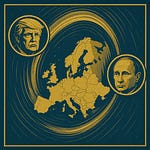The US President shocked the world on the 3rd of April as he announced universal tariffs and 20% rate for products from the European Union 🤯 🇺🇸
Regardless on whether global leaders manage to negotiate agreements with the US and reduce the effective rate, there is no doubt that global trade will never be the same. 🌍
As trade barriers move back to the 19th century, should the European Union stick to free trade and open global markets?
This is a complex question with deep political and ideological implications.
Below you can find some key insights to facilitate this conversation:
Economic impacts
Free trade is a major contributor to EU growth 🚀
However, EU’s current economic model is increasingly put into doubt 🤔
The EU is highly trade-dependent (more so than US or China) 🇪🇺
Around 31 million EU jobs depend on exports (e.g, in pharma, agri-food) 👷🏻♂️
On the other hand, import competition causes localized job losses 🤕
Adjustment mechanisms for job losses exist (like the EU Globalisation Adjustment Fund) but coverage is limited. 💔
Some industries and countries have benefited more (manufacturing, agriculture, services - Germany, Italy) 🇩🇪🇮🇹
Political & Social Effects
62% of Europeans support trade; 74% trust EU-level negotiations ✅
Skepticism among lower-income groups and countries like France 🇫🇷👷🏻♂️
As trade raises overall incomes but can worsen wage inequality 💸
Public support hinges on perceived fairness, standards, and protections 👨🏻⚖️
EU still leads trade policy, but national parliaments want more say 🇪🇺
For the moment, we need acknowledge one thing:
Trade policy is much more complex than pundits from both sides make it seem.
It is an exercise between hard trade offs that can become highly controversial. And ultimately can only be the role of politics to set the priorities.












